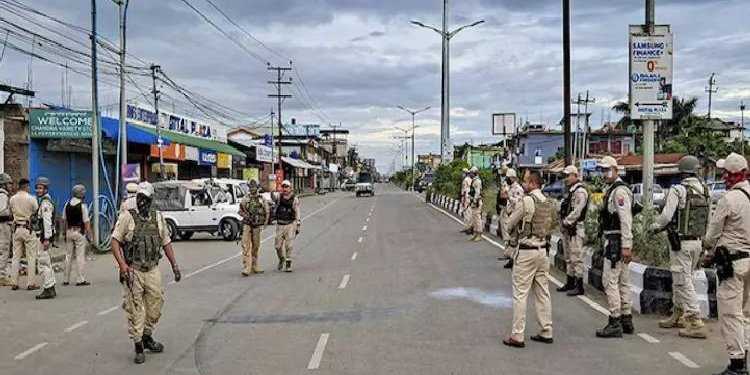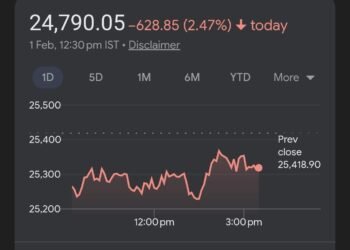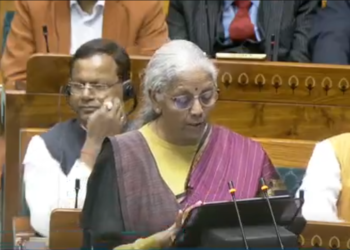BY PC Bureau
Prohibitory orders under Section 163 of the Bharatiya Nagarik Suraksha Sanhita (BNSS) were clamped across the Lilong Assembly constituency in Manipur’s Thoubal district on Monday, following a violent mob attack on the residence of Askar Ali, the chief of the BJP’s state Minority Morcha. The indefinite restrictions came into effect after a massive crowd of 7,000 to 8,000 people stormed Ali’s house on Sunday evening, April 06, 2025, and set it ablaze, triggered by his public support for the controversial Waqf (Amendment) Act.
The incident unfolded in the Muslim-majority town of Lilong, a day after Ali posted a message on social media praising the BJP and endorsing the Waqf Act amendments, which have sparked widespread protests across the state. Sensing trouble, Ali quickly retracted his statement and issued an apology, but his efforts failed to quell the rising anger. Hours earlier, thousands of demonstrators had taken to the streets of Imphal, the state capital, to protest the legislation, which critics argue encroaches on religious autonomy.
According to District Magistrate A. Subhash Singh, the mob, armed with sticks, stones, and makeshift weapons, descended on Ali’s residence around 6:30 PM on Sunday. “They pelted stones, broke windows, and eventually set the house on fire,” Singh said in a statement. “The scale of the violence necessitated immediate action to prevent further escalation.” Firefighters battled the blaze for over two hours, but the house was reduced to ashes, with significant damage reported to the surrounding property as well.
ALSO READ: Deadly Snowstorm Kills Livestock, Cripples Ladakh Nomads
In his order imposing Section 163, Singh cited a report from the Superintendent of Police, Thoubal, warning of “imminent danger to human life and properties” and a “serious breach of peace.” The prohibitory measures ban gatherings of five or more people and prohibit the carrying of firearms, swords, sticks, stones, or any objects that could be used as offensive weapons. Security forces, including the Manipur Police and Central Reserve Police Force (CRPF), have been deployed in large numbers to enforce the restrictions and maintain order in the volatile region.
A family member of Ali, speaking to a local news channel on condition of anonymity, recounted the harrowing ordeal. “We had just returned from a wedding when the mob arrived. They started throwing stones at our house. We begged them to stop and even apologised for the remarks, but they wouldn’t listen. They stormed inside, set fire to everything, and even burnt copies of the Quran. They looted cash, gold ornaments, and whatever valuables they could find. It wasn’t just about anger—it was a planned robbery,” the family member alleged. Ali and his family narrowly escaped the attack and are now under police protection at an undisclosed location.
The burning of the Quran has added a sensitive religious dimension to the incident, further inflaming tensions in Lilong, where communal harmony has historically been fragile. Local leaders have called for calm, urging residents not to retaliate while investigations proceed. Police have registered a case under multiple sections of the Bharatiya Nyaya Sanhita (BNS), including arson, rioting, and theft, and are reviewing CCTV footage to identify the perpetrators.
Curfew was imposed for an indefinite period in entire Lilong Assembly constituency in #Manipur’s Thoubal district on Monday, a day after a mob set the house of BJP minority morcha’s state President, Md Asker Ali, on fire reportedly for supporting the Waqf Amendment Act, officials… pic.twitter.com/4SnjgHuwmC
— The Statesman (@TheStatesmanLtd) April 7, 2025
ALSO READ: LPG Price Hiked by Rs 50, Excise Duty on Petrol/Diesel Up
The attack comes amid growing opposition to the Waqf (Amendment) Act, which seeks to reform the management of Waqf properties but has been slammed as an overreach by the central government into religious affairs. On Saturday, the Supreme Court acknowledged pleas challenging the constitutional validity of the Act, stating they would be listed for hearing in due course. Critics, including the Manipur Congress, have labeled the legislation “unconstitutional” and a violation of Article 25, which guarantees the right to freedom of religion.
Manipur Congress chief Keisham Meghachandra Singh condemned the Act in a press conference on Monday, saying, “This is an attempt to bring personal laws under state control through backdoor legislation. It undermines the fundamental rights of citizens and threatens the secular fabric of our nation.” He also expressed solidarity with Ali’s family, calling the attack “deplorable” but urging the public to channel their dissent through peaceful means.
Meanwhile, BJP leaders in Manipur have accused “anti-national elements” of orchestrating the violence to destabilize the state. “Askar Ali was targeted for exercising his freedom of speech. This is an attack on democracy itself,” a senior party official said, requesting anonymity due to the sensitivity of the situation.
ALSO READ: Why Manipur Hills Need an Airport: A Case for Connectivity Amid Ethnic Tensions
As Lilong remains under a tense lockdown, authorities are bracing for potential fallout. The incident has reignited debates over the Waqf Act, communal relations, and the BJP’s political strategy in Manipur, a state already grappling with ethnic and political strife.













